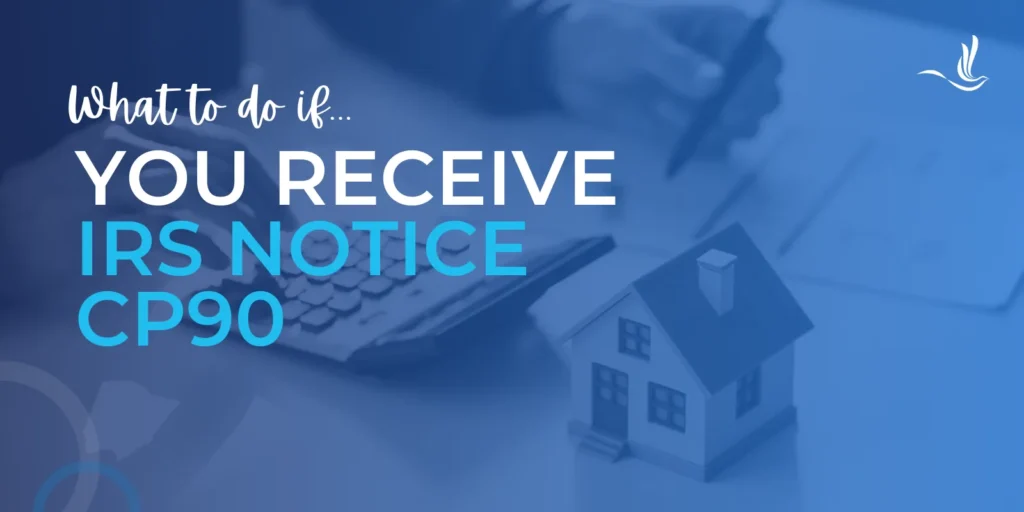
Receiving a notice from the IRS can be an unsettling experience, especially when it involves serious matters like potential tax collection actions. One such notice is the IRS Notice CP90. If you’ve received this notice, it’s crucial to understand what it means and how you should respond. Here’s a comprehensive guide on what to do if you receive IRS Notice CP90.
What is IRS Notice CP90?
IRS Notice CP90, also known as the Final Notice of Intent to Levy and Notice of Your Right to a Hearing, is a notification from the IRS indicating that you have unpaid taxes. The notice serves as a final warning that the IRS intends to levy your assets, such as wages, bank accounts, or other property, to satisfy your tax debt. This notice also informs you of your right to request a Collection Due Process (CDP) hearing within 30 days from the date of the notice.
Why Did You Receive IRS Notice CP90?
You received IRS Notice CP90 because the IRS believes you owe taxes, and previous attempts to collect the debt have been unsuccessful. The notice is issued after the IRS has sent multiple notices demanding payment, and it indicates that more aggressive collection actions, like levies, are imminent unless you take immediate action.
Steps to Take If You Receive IRS Notice CP90
If you receive IRS Notice CP90, don’t panic. You still have options. That said, it’s important to act.
Read the Notice Carefully
The first step is to thoroughly read and understand the notice. It will detail the amount owed, the tax years in question, and the deadline for responding. Pay attention to the deadlines and any instructions provided in the notice.
Verify the Information
Double-check the details in the notice to ensure there are no errors. Verify that the tax amount stated is accurate and that the notice pertains to you. If you believe there’s a mistake, contact the IRS immediately to address the discrepancy.
Consider Your Options
Once you’ve confirmed the notice’s accuracy, consider your options for resolving the debt:
- Pay the Amount Owed: If possible, pay the full amount stated in the notice to avoid further penalties and interest. You can pay online via the IRS website, by phone, or by mailing a check or money order.
- Set Up a Payment Plan: If you cannot pay the full amount, consider setting up an installment agreement with the IRS. This allows you to make monthly payments to satisfy your tax debt over time.
- Offer in Compromise: If you cannot pay the full amount or afford a payment plan, you might qualify for an Offer in Compromise (OIC). This program allows you to settle your tax debt for less than the full amount if you meet specific eligibility requirements.
- Request a Collection Due Process (CDP) Hearing: You have the right to request a CDP hearing within 30 days of receiving Notice CP90. This hearing allows you to discuss your case with an IRS officer and explore alternative resolutions to the levy.
Request a CDP Hearing
If you choose to request a CDP hearing, you must do so within 30 days from the date of the notice. Complete Form 12153, Request for a Collection Due Process or Equivalent Hearing, and send it to the address listed on your notice. A timely request for a CDP hearing will temporarily halt the levy process until your hearing is conducted and a decision is made.
Consult a Tax Professional
Receiving IRS Notice CP90 is a serious matter, and navigating the process can be complex. Consider consulting a tax professional, such as a certified public accountant (CPA) or a tax attorney, for guidance. They can help you understand your options, prepare the necessary paperwork, and represent you during negotiations with the IRS.
Respond Promptly
Regardless of your chosen course of action, it’s essential to respond promptly to the notice. Ignoring IRS Notice CP90 can result in severe consequences, including the seizure of your assets and further financial penalties.
Maintain Documentation
Keep copies of all correspondence with the IRS, including the notice itself, any payments made, and any forms submitted. Proper documentation will be crucial if you need to dispute any claims or if issues arise in the future.
What Happens If You Don’t Respond?
Failing to respond to IRS Notice CP90 can lead to severe consequences. The IRS may proceed with levying your assets, including wage garnishment. The IRS can seize a portion of your wages directly from your employer to satisfy your tax debt. They can also freeze and seize funds from your bank accounts to cover the amount owed. In some cases, the IRS can seize physical assets, such as your car or home, to settle your tax debt. Ignoring the notice will not make the debt disappear, and it could worsen your financial situation.
Tax Help for Those Who Received IRS Notice CP90
Receiving IRS Notice CP90 can be extremely intimidating, but it’s crucial to remain calm and take immediate action. By understanding your options, seeking professional assistance, and responding promptly, you can effectively address the notice and work towards resolving your tax debt. Remember, proactive steps can prevent further financial hardship and help you regain control of your financial situation. Optima Tax Relief is the nation’s leading tax resolution firm with over $3 billion in resolved tax liabilities.
If You Need Tax Help, Contact Us Today for a Free Consultation